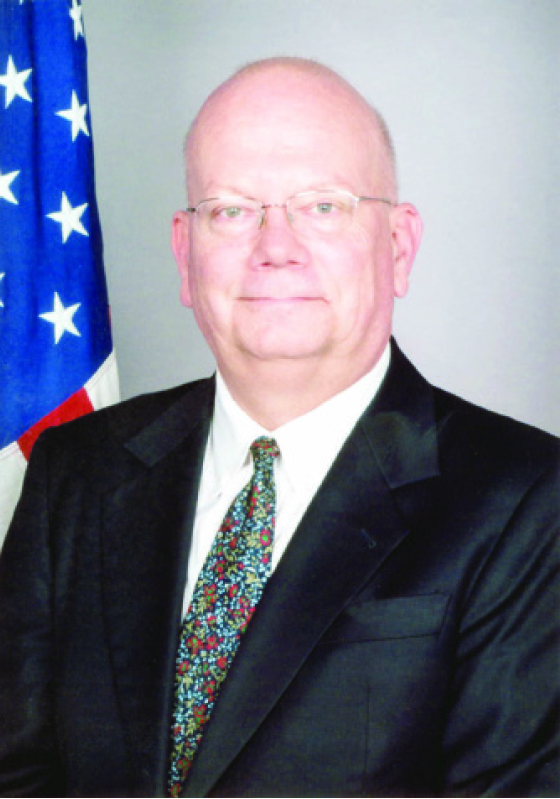United States Ambassador to Nigeria, James Entwistle, whose tenure ends this month, has demonstrated amazing knowledge of Nigeria’s social condition that enables him to render the best diplomatic service to Nigeria in recent years, writes Correspondent, SAM NWOKORO
The disposition of a diplomat in relation to issues and events in his country of primary assignment reflects more of his country’s ideals than his personal judgement. Hence the selection and posting of diplomats are issues of grave concern. That is also why ambassadors are supposed to possess extraordinary capacity to judge right, see beyond the immediate happenings around, and know more about their places of designation, much like a native than a foreigner.
It is safe to say, without fear of contradiction, that the United States (U.S.) Ambassador to Nigeria, James Entwistle, has been a shining example of the very character of Washington: dignity of the human being, plurality, freedom, openness, unflinching recognition of the human capability to create the type of world it desires – provided there is the will to commence the move.
Other ennobling qualities Entwistle has manifested in public service since 2013 when he resumed duties in Nigeria can be summarised in the following: effective communication between Washington and Africa, especially Nigeria; result-oriented engagement with the civil society; identification with the wishes and aspirations of the Nigerian peoples; and his successful articulation of the needs of his hosts, which has in practical terms reflected through effective and measurable responses from Washington.
Other worthy features of Entwistle’s tenure include his being able to maintain a cordial middle-of-the-course approach in relating with authorities in the land alongside the numerous opposition blocs in Nigeria; his homely-tuned utterances often delivered in tunes that hardly hurt, having been able to steer clear of Nigerian politics as all diplomats are wont to; and demonstrating an inspiring and disarming Nigerianess in all his social engagements with all the peoples and authorities that matter in Africa’s most populous country.
The U.S. envoy has always identified with Nigeria’s developmental aspirations. Which is why he is always on hand whenever he is invited as guest in any public function that has to do with economic development of the country.
Effective mediator
Ambassador Entwistle’s engagements throughout his tenure in Nigeria served Nigeria’s interest more when compared with those of his predecessors. The only U.S. envoy that ever delivered a service profile in Nigeria close to this is former diplomat, Walter Carrington, who served during Generals Ibrahim Babangida and Sani Abacha regimes of the late 1980s and 1990s when Nigeria was struggling to disentangle itself from the grip of military dictatorship.
The 1993 presidential election, acclaimed as the most credible in the annals of Nigeria’s elections, was reportedly won by business mogul, Moshood Abiola. But its annulment by the Babangida regime threw the polity into a seemingly indefinite stateless spin.
While trying to talk sense into the military then, Carrington had running battles with the military and was frustrated out of Nigeria. That was the period Nigerians appreciated Washington’s good intention for Nigeria. It was one of the most memorable periods of Nigeria-U.S. bilateral courtship.
Today, Entwistle has elevated and broadened the scope of relations between Aso Rock and White House, especially at this period when Nigeria’s economy is facing challenges.
Under James’ tenure, partnership between both countries deepened by more than 60 per cent from when his predecessor left. He has redoubled, on various fronts, partnership programmes of his predecessor and executed new ones. He has also offered effective supervision on some critical programmes crafted in Washington which Nigeria needs for accelerated development.
This has earned him accolades from various important personalities in Nigeria.
A reach-out buddy
Not many a diplomat have the time to listen to every minute matter. Some bother only about matters of state versus state, though the level of activities determines the volume of communication and degree of social engagement.
Those who know Entwistle say he has this knack for reaching out to people, especially those disconnected from government’s impact. By this all-embracing engagement approach, he gathers quite a good dossier about Nigeria’s social condition and the appropriate intervention or engagement programme required. Perhaps, that is why he receives invitations frequently to grace one public function or another.
It is not unusual to spot the diplomat in the midst of the youth, the aged and rustic fellows from the hinterlands discussing very intimate and mundane issues such as how the teacher behaves or flogs pupils at schools, why Nigerian spouses fight in the homes, why the price of tomato has gone beyond the reach of the common man, those infinitesimal matters. He is seen in town hall meetings, youth fora, roundtables on any imaginable state policy that agitates those affected. That, to a large measure, is a statement about the acceptability of the ambassador by his hosts. They always want to confide in him every detail because they trust him. And it is not easy to curry the trust of any Nigerian, educated or not.
Entwistle is known to have influenced most of the recent assistance to Nigeria in the fight against insurgency, in the fight against malaria outbreaks, in the campaigns against sickle cell, cancer and the need to improve on Nigeria’s electricity. He has helped connect many Nigerian youths and entrepreneurs to sundry global partnership programmes to help them hone their skills and gain more exposure to various self and group empowerments.
Many non-governmental organisations (NGOs) in Africa, especially Nigeria, have benefitted from various offers from U.S. government or its agencies aimed at deepening development in the country.
Human rights advocacy, democratic values and practices and various kinds of advocacy grants have been extended to many more groups and in fairly increased rations since the coming of Entwistle.
Unlike any other diplomat, the current vandalism of key U.S. investments in some parts of the country would have engendered trouble in Abuja/Washington ties, but the envoy understands the issues involved and has maintained statesmanlike candour, advocating peaceful resolutions and dialogue between Nigeria and various agitators.
Apart from the diplomat’s show of concern and practical involvement in various social problems in the country: from healthcare to infrastructure, democracy, good governance, security, and civil society, Entwistle has, more than in any sector of Nigeria’s growth need, been of immense help to the bringing about of the Power Africa Initiative (PAI) from U.S. President Barack Obama. He understands that is at the heart of Nigeria’s developmental trajectories. Since the launch of the initiative in 2013 as soon as he assumed office, the project has been in the front-burners and, recently, some electricity companies got grants from Washington to improve on their generation and distribution capacities.
Entwistle, during the signing of the Memorandum of Understanding (MoU) in support of the Abuja, Benin and Eko distribution companies under the PAI, revealed: “More than 700 million in Sub Sahara Africa live without access to electricity. According to World Bank, only 24 per cent of the population has access compared to 40 per cent in other low-income countries; 37 countries in Sub Sahara Africa have national electrification rate below 50 per cent, including Nigeria. Countries with electrification rates less than 80 per cent of the population consistently suffer from low income per capita than countries with higher rates.
“As an unfortunate result, millions of households rely on expensive, polluting and often unsafe power sources. Today, low rates hamper Africa’s development.”
He assured that Washington was determined “to increase power capacity by 30,000 megawatts while pushing for the creation of 60 million new connections to double electricity access”.
The PAI will also play a critical role in ensuring universal access to affordable, reliable and modern energy services, and by 2030, at the end of the Sustainable Development Agenda (SDA), Washington hopes to increase the share of renewable energy sustainability under the PAI as articulated under the United Nations 2030 SDA.
There is overwhelming view in Nigeria’s electricity industry that if only Washington is able to bring this to a conclusive execution, even if she does nothing further in Nigeria’s chaotic growth plans, it would be very worthy.
Honed diplomat
Entwistle was sworn in as the U.S. Ambassador to Nigeria on October 28, 2013. From 2010 to 2013, he had served as U.S. Ambassador to the Democratic Republic of the Congo (DRC). As a member of the Senior Foreign Service (Career Minister), he served as the Deputy Chief of Mission at the U.S. Embassy in Bangkok, Thailand, from July 2007 to June 2010. From 2003 to 2006, Entwistle served as Deputy Chief of Mission at the U.S. Embassy in Colombo, Sri Lanka, with simultaneous accreditation to Maldives.
He joined the Foreign Service in January 1981. He served in Yaounde, Douala (Cameroon) and Niamey (Niger Republic) from 1981 to 1986. From 1986 to 1990, he was a watch officer in the Bureau of Intelligence and Research and the desk officer for Kenya and Uganda in the Bureau of African Affairs. From 1991 to 1994, he headed the Refugee Assistance Unit at Embassy Bangkok, with extensive travel to Cambodia.
After serving as Deputy Chief of Mission in Bangui 1994-95, Entwistle worked in the Bureau of Consular Affairs in the Department until his assignment as Counsellor for Political Affairs at the U.S. Embassy in Kuala Lumpur, Malaysia, from 1999 to 2003.
A graduate of Davidson College in North Carolina, Entwistle speaks French and Thai fluently.
He is married to Pamela Schmoll, and they have two children.
With the indication that his tenure as U.S. envoy to Nigeria ends this July, friends whose lives he has touched have been planning series of worthy send-off in recognition of his impactful engagement with Nigerians and their government these past years.












